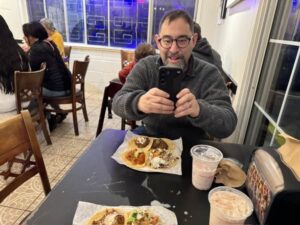 Historian and journalist Rick Perlstein is a progressive expert in conservative candidates and presidents, beginning with Barry Goldwater, who ran unsuccessfully in 1964, through Ronald Reagan. His most famous book is “Nixonland,” about Kathy’s and my old boss.
Historian and journalist Rick Perlstein is a progressive expert in conservative candidates and presidents, beginning with Barry Goldwater, who ran unsuccessfully in 1964, through Ronald Reagan. His most famous book is “Nixonland,” about Kathy’s and my old boss.
Born in Milwaukee in 1969, as a teenager he became fascinated with his natal decade’s transformative culture and politics. In four massive books published from 2001-2020, he shows how Republicans got better and better at putting together unifying narratives and winning coalitions. His current project is a book about what he calls the infernal triangle — well-organized, authoritarian Republicans, excessively eager-to-please Democrats, and a supine political media.
In town for an interview and some sightseeing, Rick came to see me at St. Paul’s Commons, Echo Park on Wednesday, where he met our old friend Br. Ambrose Cristóbal, also in town for a few days from the Bay Area. Then we went for soft tacos and Nixon, Perlstein, and Taylor stories.
Thanks to a history question a couple of weeks ago from Canon Andy Tomat, I’ve been rereading Nixon’s 1000-page memoir, which I first read 45 years ago. Obviously I bring lengthening perspective. I’m also asking what I’d call Perlstein questions. To get your vote, is someone trying to scare you or make you mad? Is someone suggesting that the other side is dangerous or deserves to be hated?
As if scripted by the Holy Spirit, just before seeing Rick, I’d finished Nixon’s brief account of the 1964 election, when he bemoaned the Arizona Republican senator’s extremism. Nixon was then aiming for a big-tent GOP, which in those days was the smaller party by far. Nixon won in his own right four years later, stressing many issues, including hanging tough in Vietnam and standing up to antiwar and racial justice demonstrators, the code words being law and order.
The day after the 1968 election, Nixon said he wanted to bring the country together. I have no doubt that did. That was his mother, Hannah, talking. But you can’t turn political passion on and off like that giant spigot Trump told us about in the California water system. When you make people into enemies or focal points of fear — communists, demonstrators, feminists, insurance executives, immigrant workers, or middle school volleyball players who are in inch taller than your daughter because they’re trans — the healing can take years. I wonder if there’s any way back once the presidency becomes a continuation of the campaign, the politicians finally having realized that healing, unity, and the dignity of every human being are for suckers.
